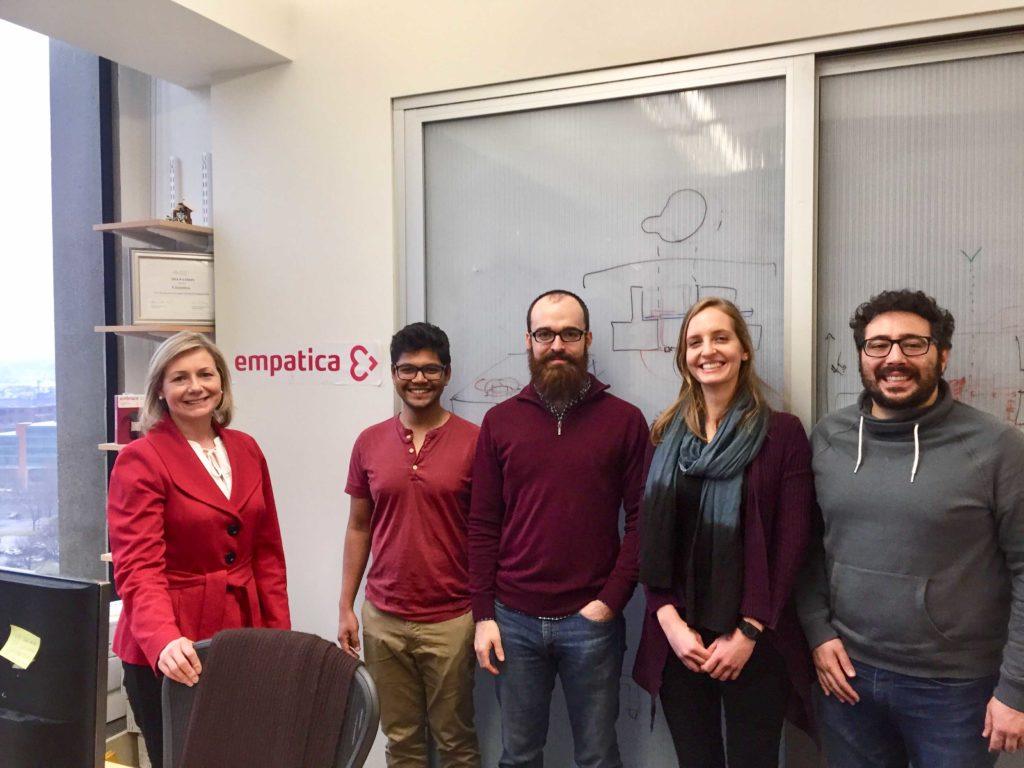Things are not often how they appear to the naked eye. The people we pass by on the street, the friends we share laughs with, and even the family members we claim to know inside and out have hidden histories. One particular story is that of periodic seizures. As seizures become more common among college-age adults, advocacy and innovation must operate in tandem not only to inform the development of new forecasting technologies but also to dismantle the stigma associated with revealing one’s history of seizures. Rosalind Picard, co-founder of Empatica, Inc., faculty chair of the Massachusetts Institute of Technology’s Mind+Hand+Heart Initiative, and trailblazer in the burgeoning field of Affective Computing, sees the road ahead as a human-centered endeavour worthy of her life’s work.
As the daughter of a Navy pilot, Picard was a seasoned globetrotter by the time she was 7 years old. While native to Boston, she has lived in California, Florida, South Carolina, and even Keflavik, Iceland, for a period of time, learning to assimilate quickly into the worlds around her along the way. She earned an engineering degree, landed a high-profile job at the world-renowned Bell Labs in New Jersey, and went on to invest in numerous collaborative research projects and teaching positions at MIT. On the surface, this progression might feign linearity or even a lack of friction, with few obstacles in the way. Picard’s story, however, is one molded by dichotomous forces: intention and fortune, welcomed failure and unexpected success, stability and limbo.
“I was the unwanted pregnancy of a 17-year-old college student who thankfully did not choose to have an abortion,” said Picard as a smile began to form at the corners of her mouth. “I was adopted by a wonderful family … [They’re] the ones I call my mom and dad. So I’ve come full circle from being born to a college student to becoming a college professor.”
Picard’s childhood interests did not provide any particular indication of the work she would eventually do in the future. In fact, she grew up with quite an aversion to science, preferring to indulge in quiet moments of independent exploration above all else.
“I never imagined I would be a scientist, an inventor … I did think I would be a teacher at one point,” Picard said. “I liked to play with my stuffed animals and about one other friend. I was pretty much a keep-to-yourself child.”
After college and taking a job at Bell Labs shortly thereafter, Picard developed a fascination with research, particularly within realms of inquiry that had little precedent. She thought that school was often about acquiring information and insights that others already had, and this grew stale for her. There was uncertainty as to the results of any given project, but that was precisely where the allure for Picard laid.
“I realized how much more fun it was to do research than it was to learn stuff that people already knew,” Picard said. “Suddenly I was doing research on things that nobody knew … [Research] was more about exploration and discovery than it was about ‘Can you solve this problem that you can look up the answer to in the back of the book?’”
Fueled by this desire to push the boundaries of knowledge in her field, Picard, with support from Bell Labs, went on to obtain a master’s degree and Ph.D. from MIT. Without the added stress of grades and exam preparation, she found her research initiatives to be fun and satisfying, bringing her into close contact with lots of talented individuals from diverse specialties.
At the same time that she was up for tenure at MIT shortly after accepting a teaching position, Picard had been pioneering research in the field she developed called Affective Computing. This field is concerned with research involving computing that relates to emotion, arises from emotion, or deliberately influences emotion and other affective phenomena. Despite being a disregarded area of inquiry for most investigators, Picard believed that there was great value in understanding whether technology could be leveraged to measure emotion from faces, voices, and even human physiology. This work in the realm of human-robot interaction set the groundwork for Alexa and Siri to be developed later on, as stress and frustration—ignored by emotion theorists—are the most common emotions associated with computer interactions. Few people latched onto the idea at first, but Jerry Wiesner, former president of MIT, offered Picard a timely piece of advice that would serve as a guiding leitmotif for her future work.
“I asked him what junior faculty should really be doing, and he said ‘Take risks.’ So I took the risk thinking ‘What am I doing?’” Picard said. “Was all my hard work to build a good reputation being flushed down the toilet?”
The transformation was gradual but steady, as more and more academics, researchers, and innovators began to look into Affective Computing as an insight into how best to design intelligent machines for interfacing with humans. Years of research on stress in children with autism and continued collaboration with MIT Media Lab students began to point Picard toward an inevitable “next step” for success in the lab: commercialization of the resulting technologies. Altruism polished away any initial reluctance to build a startup that she harbored.
“I thought companies were evil,” Picard said. “I felt like I was going to the dark side. But we had to start it because we had so many people who could benefit from our technology.”

Co-founded by Picard, Matteo Lai, Maurizio Garbarino, and Simone Tognetti, Empatica was born in 2014, translating what began as a research fascination into a wearable form factor similar to that of the Apple Watch. Empatica currently offers two products in the form of the FDA-approved Embrace wristband, which uses AI and machine learning to continually track, detect, and even forecast seizure episodes via physiological data sensed from the wrist, and the E4 wristband designed for researchers to acquire real-time physiological data visualized through a software. When the Embrace wristband detects that a seizure is happening, it relays this message to the user’s paired phone and sends an alert to all individuals listed as caregivers in the Empatica Alert App.
While Empatica does sell its Embrace wristbands directly to consumers, the team is working with about eight or nine elite research hospitals in Boston and around the country to distribute them to patients in need. Even though Empatica’s particular area of interest lies in seizure detection, it ultimately wants to provide a multifunctional and aesthetically sleek wearable device for everyone.
“We really want to make it a gorgeous device that people who just want a super high-quality measurement watch can wear,” explained Picard. “It’s doing a lot that even people without epilepsy are interested in, such as tracking sleep quality.”

The human impact of Empatica’s work is significant, not only in helping epilepsy patients obtain the support they need from family and friends but also in creating a true community of caregivers for those with frayed social networks. Despite being relatively low-risk incidents, seizures are proving to be problematic topic of discussion on college campuses where privacy is not always available. There is often a stigma attached to talking about one’s own experience with seizures, but Picard hopes students will step beyond this obstacle and open up a dialogue about issues around seizures and depression. She encourages college students to talk with their roommates and friends about being informal caregivers or “buddies” should either of them have a seizure on campus. With the Embrace wristband and the Alert App, Empatica is in many ways trying to strengthen the essential human bonds that help us lead healthy and empowered lives.
“Only when you go through everything and ask questions do you learn about things that you weren’t expecting to find,” Picard said. “Always seek understanding.”
Featured Image by Alessandro Zenati / Heights Editor













